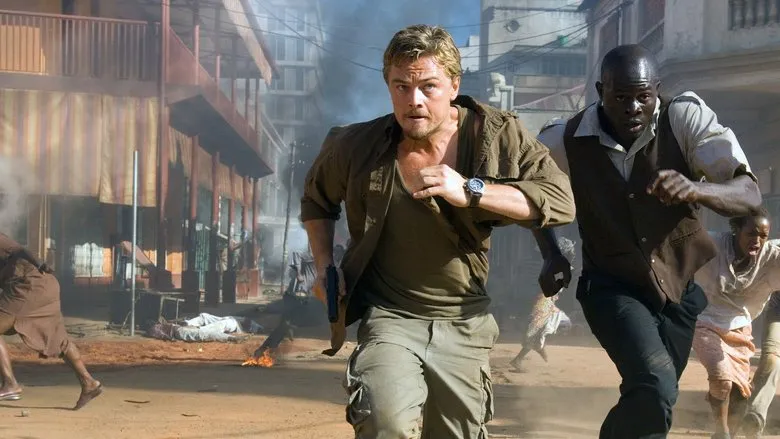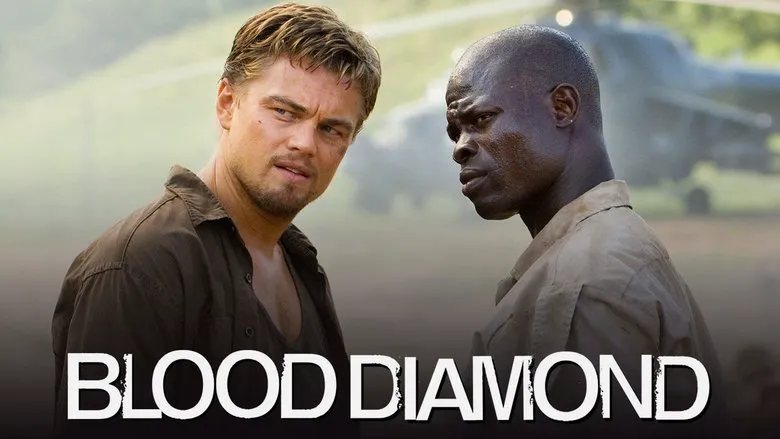“Blood Diamond” Showcases New Facets of Leonardo DiCaprio’s Talent
Hollywood is experiencing a veritable African boom. The dream factory is clearly trying to shift the focus from the Middle East to the Black Continent, where the American army’s endeavors aren’t progressing as smoothly as those of Schwarzenegger and other “last action heroes” who successfully battled Arab terrorists on screen throughout the '90s. In just a few years, politically charged films like “Country of My Skull” (2004), “The Interpreter” (2005), “Hotel Rwanda” (2004), “The Constant Gardener” (2005), and “Lord of War” (2005) have emerged. Even the entertainment-driven “Sahara” (2005) contained numerous references to Africa’s real-world woes. And in the upcoming Oscar nominations, two “African” films are vying for recognition: “The Last King of Scotland” (2006), which is still seeking a distributor in our country, and “Blood Diamond” (2006), a thought-provoking entertainment piece by Edward Zwick (“The Last Samurai” (2003)).

If films were judged solely on good intentions, “Blood Diamond” might receive the highest score. Especially since most of us, who manage perfectly well without transparent gemstones, wouldn’t find it difficult to forgo these “best friends of girls” if they come with a bloody trail. And they do. Because Africa is turbulent. And, as fate would have it, particularly in those countries where diamond-bearing kimberlite pipes surface. From the chaos of civil wars in Congo, Côte d’Ivoire, and Sierra Leone come supplies of so-called “blood” or “conflict” diamonds, as the largest players in this market (such as De Beers) officially do not make purchases in hotspots. However, extraction continues there, as diamonds have become for Africa practically what cocaine is for Latin America – an apple of discord with the civilized world and the only way to extract money from it. Apparently, the criminal-production schemes for laundering blood from diamonds are no less fascinating than drug trafficking. However, the film only touches on this in passing. But even a dotted-line sketch of a West African diamond’s journey through India to London is enough for the plot of another blockbuster.
Setting the Stage: Sierra Leone, 1999
The action of “Blood Diamond” takes place in 1999, at the height of the civil war in Sierra Leone. All the win-win moves are used – from socio-political to adventure-tourism. There’s forced labor in diamond mines; legends of a stone that can provide for several generations; and bandit feuds, which, as in any hotspot, need only a trivial reason to ignite. And American mercenaries, left over from local wars and revolutions, using Soviet military equipment to pursue their own policies on the continent. And crowds of stringer journalists, missionaries, and volunteers from various humanitarian foundations, traveling through wild Africa like Dr. Dolittle with expired aspirin, collecting evidence for human rights dossiers, and at the same time taking pictures that look particularly impressive on the expensive paper of supposedly intellectual magazines. And, of course, incredible African sunsets, impenetrable jungles, and breathtaking landscapes. Against this picturesque backdrop, fate brings together two native Africans – a white adventurer, a cynical romantic, a former mercenary Archer (Leonardo DiCaprio), who earns a living by smuggling diamonds, and a black peasant-fisherman Solomon (Djimon Hounsou), trying to find his son, taken by rebels from a destroyed village. They are united by only one thing – the desire to find a giant pink diamond, which in the film becomes a symbol of both freedom and unfreedom. And for the sake of romance and ideology, a progressive journalist, Maddy (Jennifer Connelly), is added to them, having exchanged the tiresome Afghanistan and Bosnia for the current nightmares of Sierra Leone.
A Compromised Masterpiece?
The adventures of such a diverse company could have put Indiana Jones to shame, but times are different now. Simple entertainment is no longer in vogue in Hollywood. However, the minutes of UN meetings are not yet turning into exciting plots. Attempts to make a statement on a topical issue out of entertainment cinema give rise to compromise monsters like “Blood Diamond.” The titles framing the film with mournful statistics give it a persistent flavor of political information. The director uses coercive means of pressure on the audience with a clear excess, which turns the problem film into a computer quest, where mass murder, kidnapping, forced labor, robbery, terror, diamonds, and camps seem to be stages that the player must go through to get out of Africa. The plot scheme from the very beginning leaves no doubt as to who will be the winner. The noble simpleton-African, constantly getting away with it, and the smug journalist, for whom a laptop is stashed under every bush, manage, against all logic, not only to survive, but also to squeeze all the desired benefits out of a hundred-carat diamond.
The Unintended Legacy
Perhaps the authors of the film envisioned an international trial against De Beers, which, however, is never mentioned in the film, followed by the cleansing and closure of the largest jewelry houses. However, everything was limited to the fact that in South Africa, the birthplace of the concern, they decided to ban the screening of “Blood Diamond,” many Western glossy publications were politely advised not to print announcements, so as not to have to reduce the number of advertising pages later, and the famous environmentalist Leonardo DiCaprio was just as politely invited to visit real diamond mines and make sure that there is no one’s blood on the diamonds. But the owners of the diamond mines could not have worried at all. In the memory after watching the film, only DiCaprio’s character Archer remains, not too concerned about humanism, the legalization of diamond mining, and the future of the Black Continent.

Perhaps the first contender for the role of Archer, brutal and gnarled, would have been more believable in this role. However, DiCaprio played not just a fragment of colonial wars, a devastated soldier of fortune, but the heroic quintessence of adventurism. No matter how much the script, with its concern for the correct placement of accents and bringing all lines to an ideologically verified finale, pushes the hero to atone for sins, repentance, and remorse, the actor skillfully resisted, playing a man who does not need any excuses. Of course, it would be foolish if DiCaprio, whom the academics have so far been avenging for his incredible fame, bypassing deserved awards, starting with “Titanic” (1997) and ending with “The Aviator” (2004), receives his first “Oscar” for his role in the mediocre “Blood Diamond.”
But the acting itself is worth it.